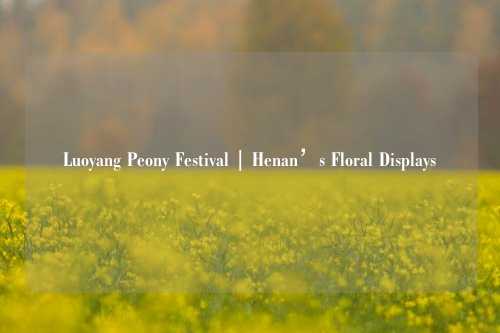Luoyang Peony Festival | Henan’s Floral Displays
A Celebration of Beauty and Tradition
The Luoyang Peony Festival is one of China’s most spectacular floral events, attracting visitors from across the country and beyond. Held annually in Luoyang, Henan Province, this festival showcases the city’s deep historical connection to peonies, a flower long revered in Chinese culture. The event spans several weeks in spring, when millions of peonies burst into bloom, filling the air with their delicate fragrance and transforming gardens into colorful landscapes.
The Historical Significance of Peonies in Luoyang
Luoyang has been associated with peonies for over a millennium, earning it the title of "City of Peonies." During the Tang Dynasty, the flower became a symbol of prosperity and elegance, often depicted in poetry, paintings, and royal gardens. Emperors and scholars admired the peony for its graceful appearance, and its presence in Luoyang grew as cultivation techniques improved over the centuries. Today, the city continues this legacy by preserving rare and ancient peony varieties, ensuring that future generations can appreciate their beauty.

The Best Locations to Experience the Festival
Several parks and gardens in Luoyang serve as the main venues for the Peony Festival, each offering a unique floral display. Wangcheng Park is one of the most popular sites, featuring thousands of peony plants in various colors and sizes. The China National Flower Garden is another must-visit location, boasting a vast collection of peonies, including rare and ancient breeds that have been carefully preserved over generations.
Luoyang International Peony Garden is particularly famous for its diverse peony species sourced from around the world. Visitors can see blossoms in shades of pink, white, yellow, purple, and even deep red, each variety carrying its own cultural symbolism.
The Cultural Activities and Performances
The Peony Festival is not just about flowers—it is a celebration of Chinese heritage and artistry. Throughout the event, visitors can enjoy traditional music, dance performances, and theatrical reenactments that bring Luoyang’s rich history to life. Folk artists demonstrate calligraphy, painting, and embroidery, often featuring peony motifs in their creations.
A highlight of the festival is the Peony Fairy Pageant, where performers dressed in elaborate costumes inspired by Tang Dynasty fashion bring an air of elegance to the festivities. These cultural elements enhance the visitor experience, making the event a blend of visual delight and historical appreciation.
The Role of Peonies in Chinese Art and Literature
Peonies have long been a source of inspiration for poets and painters, many of whom have captured their charm in works that remain celebrated today. Famous poets such as Bai Juyi and Liu Yuxi wrote about peonies in verses that praised their grace and symbolism. Traditional Chinese paintings frequently feature peonies, often depicted alongside birds and butterflies to represent harmony and good fortune.
During the festival, art exhibitions display historical and contemporary pieces that highlight the flower’s influence on Chinese aesthetics. These works provide insight into how peonies have been cherished throughout different dynasties, reinforcing their status as a national treasure.
The Best Time to Visit for Peak Blooms
Timing is essential for visitors hoping to witness the peonies at their peak. The festival typically begins in early April and lasts until early May, but the best viewing period depends on weather conditions. Early-blooming varieties start to open in the first weeks of April, while late-blooming species reach their full beauty closer to May. Travelers should check the official festival updates to plan their visit accordingly and experience the most vibrant displays.
The Influence of Peonies on Local Cuisine
Luoyang’s Peony Festival extends beyond visual and artistic experiences to include culinary delights inspired by the flower. Local chefs incorporate peonies into dishes, creating flavors that are both delicate and aromatic. Peony-infused tea, peony wine, and peony pastries are among the specialties available during the festival. These unique treats provide visitors with a way to enjoy the festival through taste, adding another layer to the cultural experience.
The Symbolism and Meaning of Peonies
In Chinese culture, peonies symbolize prosperity, honor, and happiness. They are often associated with wealth and good fortune, making them a popular motif in celebrations and traditional decorations. During the festival, many visitors purchase peony-themed souvenirs, such as embroidered fabrics, ceramics, and paintings, to take home as symbols of good luck.
The flower’s connection to royalty and high status dates back to the Tang and Song dynasties when peonies were cultivated in imperial gardens. Their continued importance in Chinese tradition highlights the deep cultural roots that the Luoyang Peony Festival seeks to preserve and share with the world.
Exploring Luoyang Beyond the Festival
While the Peony Festival is the highlight of spring in Luoyang, the city offers many other historical and cultural attractions worth exploring. The Longmen Grottoes, a UNESCO World Heritage site, features thousands of Buddhist statues and carvings that date back over a thousand years. White Horse Temple, often regarded as the first Buddhist temple in China, provides a glimpse into the country’s religious history.
For those interested in ancient Chinese dynasties, the Luoyang Museum houses artifacts from the city’s time as a capital during multiple historical periods. These sites, combined with the natural beauty of the Peony Festival, make Luoyang a destination that blends history, culture, and nature seamlessly.
A Festival That Captivates Visitors Year After Year
The Luoyang Peony Festival continues to attract visitors from across the globe, offering a floral spectacle unlike any other. Whether admiring the gardens, experiencing traditional performances, or enjoying peony-themed cuisine, attendees are immersed in a celebration that honors both nature and history. As the city embraces its role as the home of China’s most beloved flower, the festival remains a symbol of beauty, heritage, and the enduring charm of Luoyang.
















